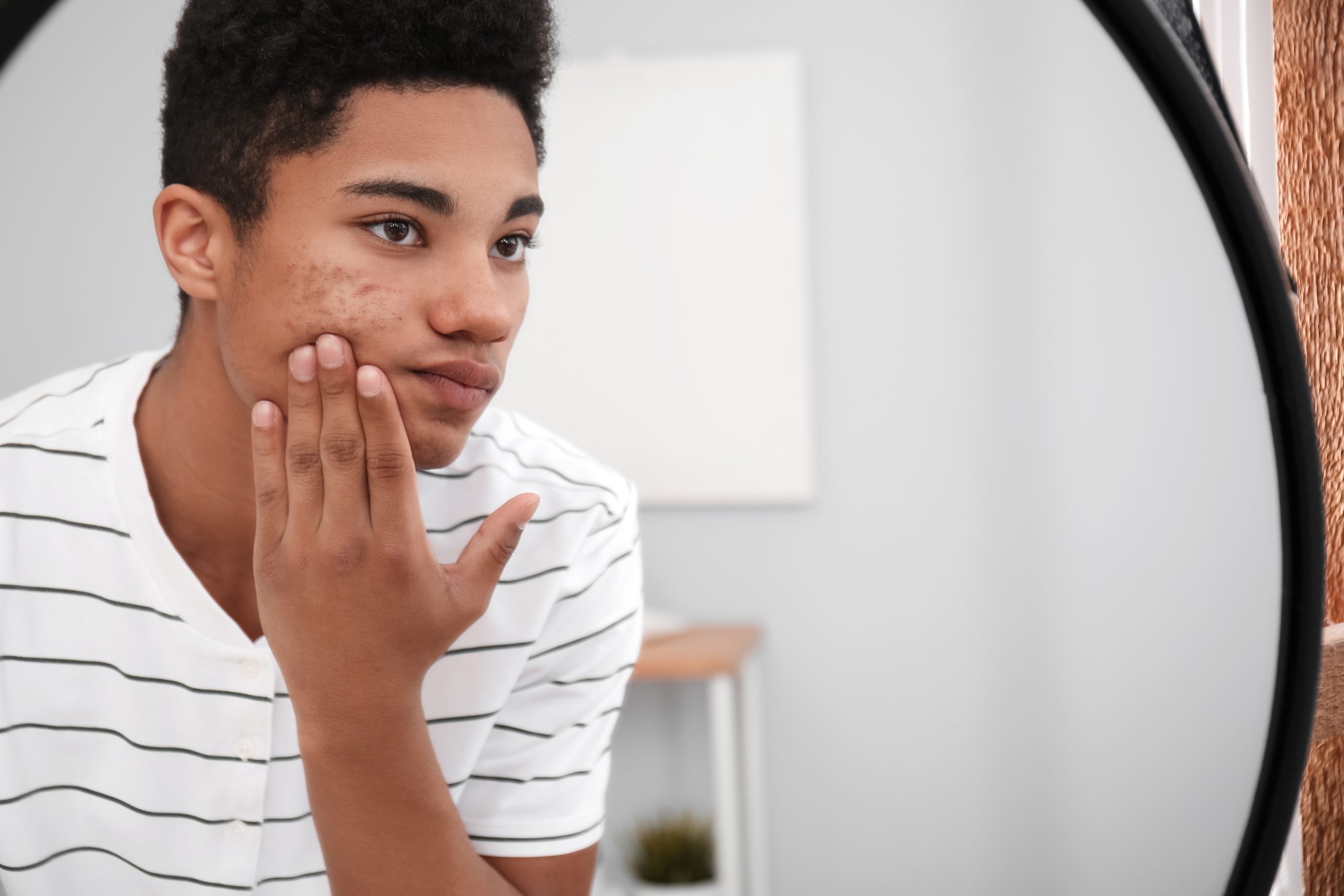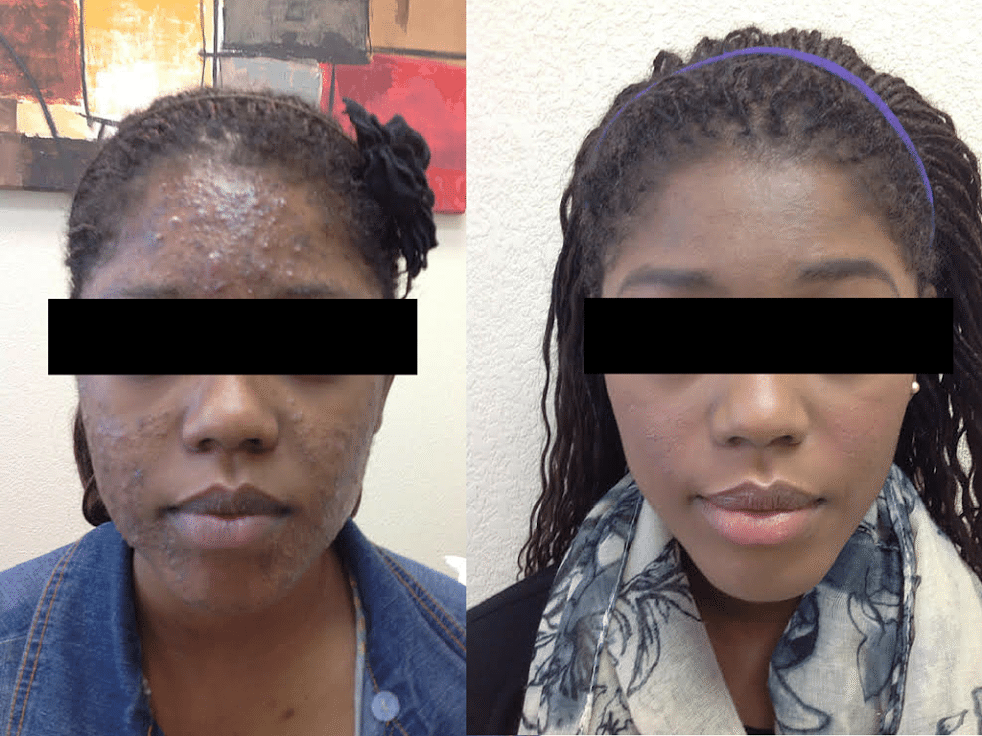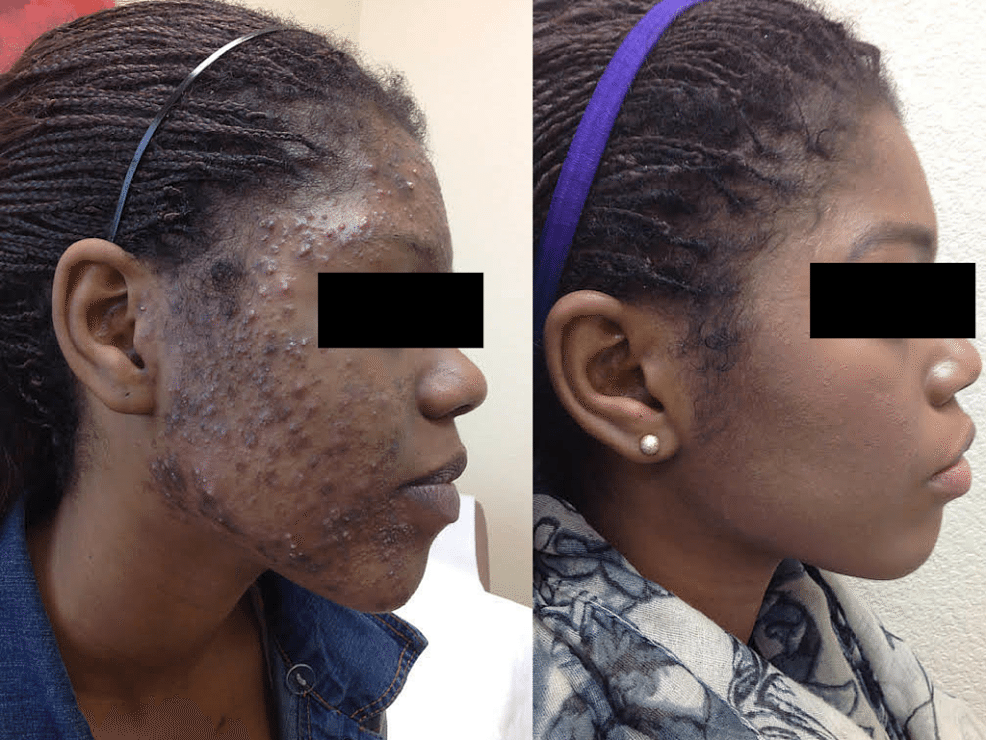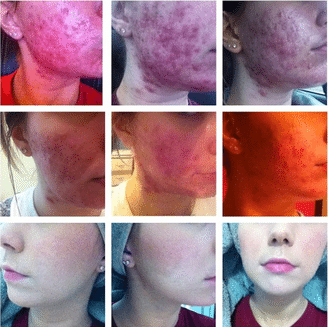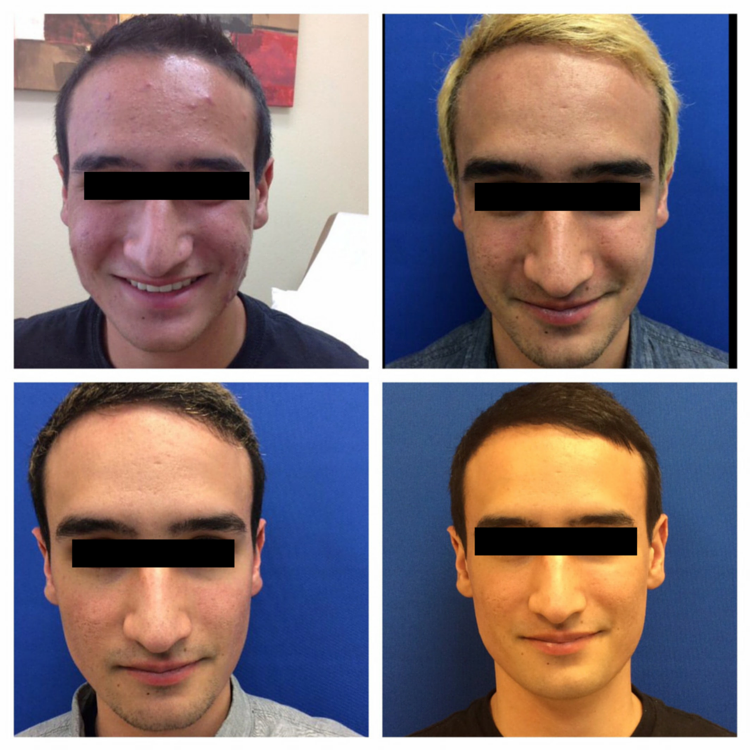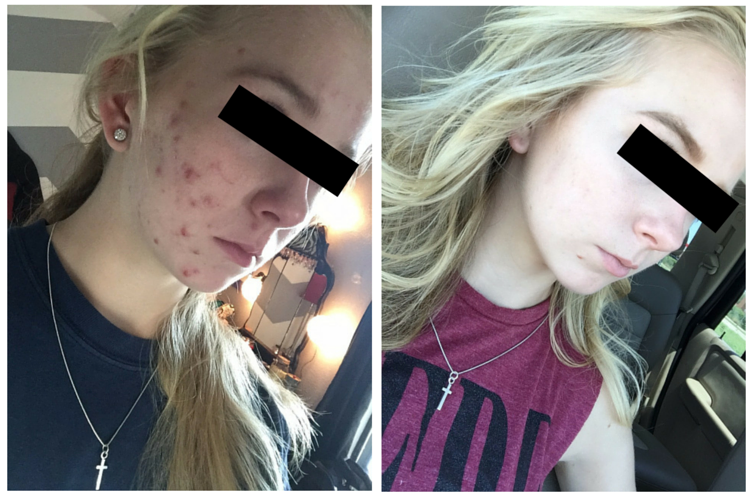Acne can have a big impact on your life, which is why we take acne treatment very seriously and use aggressive treatment plans when necessary. Our staff is passionate about treating acne to prevent the emotional and physical scars that can last a lifetime.
Acne affects both men and women, teenagers and adults—all of whom can have different reasons for their condition. If left untreated, acne often causes scarring and discoloration, impacts self-esteem, and can even be disfiguring.
What Causes Acne?
Blackheads
A blackhead (technically called an open comedo) occurs when a plug of oil and skin cells blocks a hair follicle opening. The pore is open, so the oil is exposed to air, causing it to turn dark. The oil is oxidized, just like a banana or apple might turn brown when left out in the air.
The primary symptom of blackheads is dark, black-looking plugs in the hair follicles of the skin. Blackheads usually form on the forehead, nose, and chin, but they can also appear on the back, chest, shoulders, ears, and arms.
Whiteheads
A whitehead (closed comedo) or whitehead is a white bump that forms on the surface of the skin. A whitehead comes from the same basic pore blockage as a blackhead, but the pore is closed so the oil and skin cells so it shows up as a white bump rather than an open blackhead.
Adolescent/Teen Acne
Adolescent and teen acne is caused by a combination of clogged pores, surface bacteria, and overproduction of oil (especially high during teenage years). Teenage acne is characterized by an inflamed appearance, with swelling, redness and pain.
Adult Acne
Adult acne typically occurs in the late 30s to 50s, but many adults, particularly females, battle acne from adolescence into adulthood. It tends to appear on the chin or jawline, and the main causes are changing hormone levels, stress, irritating products, acne-prone skin and medication side-effects.
Cystic Acne
Cystic acne is the most severe with deep pus filled cyst that look like large lumps. Not only is it painful and long-lasting, but it’s caused by deep inflammation and infection due to blocked glands, which enhances its overall appearance.
Acne Treatments
Understanding the root cause of each patient’s acne is needed to select the correct treatment regimen. Epiphany providers use lasers, extractions, peels, and topical and oral medications to help address all different causes of acne.
We are also experienced in prescribing isotretinoin (Accutane, Absorbica) for cystic acne that does not clear with other treatment approaches. Isotretinoin is a medication that requires a physician who is registered and experienced in its use, but it can be very helpful to quickly and effectively treat cystic acne.
Prescription Vs. Non-Prescription Drugs for Acne
Don’t confuse non-prescription products for the more effective prescription drugs dermatologists use to fight acne. Over-the-counter products can be helpful for patients with mild acne, but when you have more than 5-10 red bumps on your face at a time, you may have acne that requires the care of a dermatologist.
Products that require a prescription must be proven to work on thousands of patients and found to be safe to use before they are approved by the FDA. In general, over-the-counter products are usually less effective than the products a physician prescribes.
Accutane
How Does Accutane Work?
Accutane (the brand name for the drug isotretinoin) works by training the skin cells around the opening of the pore to be more ‘mature’ and not get clogged up. It also trains the oil glands to be more ‘mature’ and not produce so much oil. When the pore stays open and the amount of oil on the face is normalized, the bacteria that causes acne. And less oil means fewer pimples.
With most patients, oil production permanently decreases. Because of the long-lasting reduction in oil production after Accutane, the chance of acne recurrence is significantly lower.
What Should I Expect After Accutane Treatment?
Accutane is typically a six-month course treatment. Most patients will see an improvement in their acne within the first month. By month three or four, many patients are noticing complete clearance of their acne. By month five or six, their skin is completely clear. You’ll see drastic results in the clarity of your skin before and after Accutane.\
Acne Surgery
What is Acne Surgery?
Acne Surgery, also called extractions, is the removal of debris from the pores. It can also include the removal of milia – small keratinous cysts. Acne lesions also known as comedones can be either open (blackheads) or closed (whiteheads). The instruments used are sterile lancets and comedone extractors. When indicated, a mild, beta hydroxy acid chemical peel will be applied to the skin. The peel will help to remove dead skin cells and rejuvenate the skin.
What Should I Expect After Acne Surgery?
There is often pinpoint bleeding, swelling, and redness associated with this procedure, but it will subside within 12 hours. Tiny scabs can develop after the first 12 hours. Reactions to the chemical peel vary from no change, to slight redness similar to a mild sunburn. Approximately 2 days following the peel the skin may begin to flake and peel. Flaking and peeling can last 2-4 days. Sunscreen is highly recommended, and makeup can be applied the day following the procedure.
Acne FAQs
How many types of acne are there?
There are three types of acne including:
- Adolescent/ teenage
- Adult
- Cystic
Ranging in severity, appearance and painfulness, acne is best diagnosed by a dermatologist who can create a treatment plan for your specific needs.
Is my diet causing my acne?
Likely no. However, there’s a debate within the medical community about the correlation between diet and acne. While more research is needed on the topic, the presence of acne is more likely linked to other factors besides what you’re eating or drinking. If you do notice a difference with specific foods, eliminate them to see if your skin’s appearance improves.
What’s the difference between blackheads and whiteheads?
Despite their color, blackheads and whiteheads are both non-inflammatory pores clogged with dead skin and oils. The only difference between the two is that blackheads are an open pore — giving it a different color due to oxygen — while whiteheads are closed.
Is Accutane right for me?
Accutane is used only for severe acne that doesn’t respond to topical treatments. Prescribed by your dermatologist, Accutane takes about 6 months of usage to work with most patients reporting little to no acne flare-ups after treatment is completed.
How do I know if my acne is serious?
Severe acne appears on the face, back and chest and won’t go away with over-the-counter products. Patients with acne deal with a combination of pus bumps, blackheads, cysts, discoloration and sometimes even true scarring.
The biggest indicator that your acne is serious is if it’s affecting your daily life. Your dermatologist can not only prescribe you the appropriate medication for your acne, but can address what’s problematic on the surface of the skin, including marks left from old breakouts, and what’s causing the acne under the skin.
Am I too young/ old for acne treatments?
Unfortunately, there are few age limits on acne, and some patients can develop acne as they age. Children and adults who notice acne where it wasn’t before, should contact their dermatologist to assess the symptoms, causes and best treatment options.
Acne Treatment Before & After Photos
The results you achieve may be different, but you should schedule an appointment with a physician to obtain a treatment regimen that is right for you. We welcome your questions on acne! We often have people ask about how food, products and hormones affect their skin. Contact Epiphany Dermatology today to get your questions answered and get on the road to healthier, clearer skin!
Additional Acne Resources
- Acne Break-Outs: Causes, Symptoms, & Treatments [INFOGRAPHIC]
- How to Treat Acne Scarring
- How To Treat and Prevent Acne During Pregnancy
- Teen Acne Treatments: How To Get Rid Of Frustrating Breakouts
- Why Are Some Pimples So Painful? (And How to Stop the Pain!
- The Dermatologist’s Guide to Getting Rid of Blackheads
Click here to find an Epiphany provider near you.


